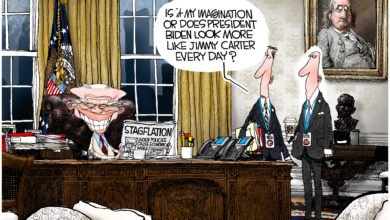Yes, Jen Psaki Violated the Hatch Act. Here’s What That Means.
On Friday, Citizens for Responsibility and Ethics in Washington, a leftist watchdog group, filed an ethics complaint against White House press secretary Jen Psaki for allegedly violating the Hatch Act. The offending statements came courtesy Psaki appearing to carefully endorse Democrat Terry McAuliffe’s struggling campaign for the Virginia governorship.
This comes a day after former press secretary Kayleigh McEnany took to Twitter to call out Psaki for a Hatch Act violation over the same statement.
Fox News reports:
In the comments CREW took issue with, Psaki responded to a question about the Virginia gubernatorial race by first acknowledging she had “to be a little careful about how much political analysis I do” from the podium. She then went on to say, “Look, I think the president, of course, wants former Governor McAuliffe to be the future governor of Virginia.
“There is alignment on a lot of their agenda, whether it is the need to invest in rebuilding our roads, rails, and bridges, or making it easier for women to rejoin the workforce,” she continued.
She later added, “We’re going to do everything we can to help former Governor McAuliffe, and we believe in the agenda he’s representing.”
CREW said that Psaki’s comments appeared to have violated the Hatch Act, which forbids officials from using their “official authority or influence for the purpose of interfering with or affecting the result of an election.”
Precedent would suggest that this is a fairly cut-and-dry violation of the Hatch Act (however, this isn’t something that should be taken particularly seriously — more on that later). Psaki, while executing the duties of her position as press secretary, made a specific endorsement of a political candidate and suggested the administration she represents would be doing “everything [they] can to help former Governor McAuliffe” and effectively endorsing his agenda. That is an open admission of intent to affect the outcome of an election and an open usage of a federal government position for expressly partisan purposes.
The natural response of the left, predictably, has deviated very little from a general notion of “but Trump.”
Sorry but there’s no way Kayleigh McEnany can be complaining about potential Hatch Act violations by the Biden admin after McEnany defended Trump’s move to host the actual RNC Convention at the White House.
— Hugo Lowell (@hugolowell) October 15, 2021
Oh, so now Kayleigh McEnany wants the Hatch Act enforced against others ? LOL, she’s a criminal and an idiot.
— Palmer Report (@PalmerReport) October 15, 2021
While members of the Trump administration certainly have used their positions to engage in political behavior (for instance, Kellyanne Conway violated the Act so often that the Office of the Special Counsel recommended her to be removed from her position), Hatch Act cases against the administration were hard to take seriously. During last year’s Republican National Convention, the Act became a point of contention for leftists looking for an opportunity to charge Trump administration officials with violations for invoking the duties of their offices during the eponymously partisan event. While these charges were certainly justified, they were nowhere near as scandalous as the left made them out to be.
At the time, Dan McLaughlin of National Review wrote an excellent piece deconstructing the claims made by the left, in which he referred to historical precedent to establish the Act’s expectation of unadulterated political apathy as a sham:
The norm, even when respected, has been something of an open fraud. Did anyone actually think that John Kerry or Hillary Clinton or James Baker (who had previously been a campaign manager for Gerald Ford, Ronald Reagan, and George H.W. Bush) were apolitical figures? Or, going further back, that William Jennings Bryan, James G. Blaine, Henry Clay, or Thomas Jefferson were above politics? Three presidents (James Madison, James Monroe, and John Quincy Adams) were elected president while serving as secretary of state. James Buchanan and Daniel Webster both sought their party’s nomination while serving in the job. Jefferson more or less created the Democratic Party while serving as secretary of state; Clay got the job as part of a deal to resolve the 1824 election.
The broader claim that cabinet secretaries don’t speak at political conventions is even more laughable; as Jim Geraghty notes, six members of Barack Obama’s cabinet addressed the Democratic convention in 2012.
If one were to make a desperate reach and try to play devil’s advocate, a similar argument could reasonably be made for Psaki; the woman is effectively an appointed mouthpiece for the Democratic Party. That’s what press secretaries do, which is why I’m usually rather wary of the integrity of taxpayer-funded PR in general. Making the case that Psaki’s position in government is apolitical by nature is akin to making a case for Bill Clinton’s chastity.
However, as McLaughlin noted last year, openly stumping for a political cause or candidate seems to be where the line is drawn. This, he elaborates, was the case for Obama-era Health and Human Services Secretary Kathleen Sebelius when she used a Human Rights Campaign event to push Obama’s reelection bid, and Housing and Urban Development Secretary Julian Castro when he used the capacity of his office to express support for Hillary Clinton’s 2016 campaign.
Again, precedent suggests a clear violation by Psaki, although no real ramifications, let alone serious ramifications, usually come of such violations. The Hatch Act serves as more of an ethics standard than a serious legal statute, and violation is penalized through civil means.
On one hand, the Hatch Act is an integral barrier to the usage of taxpayer funds and government resources for expressly partisan political purpose. However, there exists a delicate balance between governmental accountability and the First Amendment rights of public officials that must be addressed in dealing with Hatch Act-related cases — and for that reason, I’ve been a proponent of reforming the Hatch Act for quite some time.
Content syndicated from TheLibertyLoft.com with permission.





